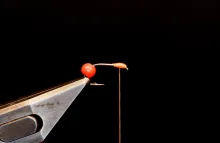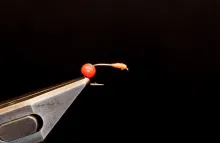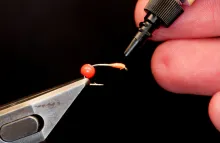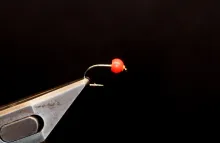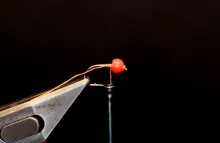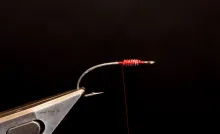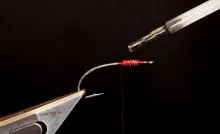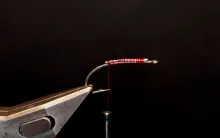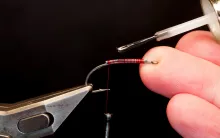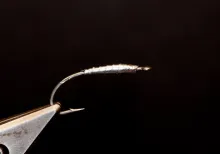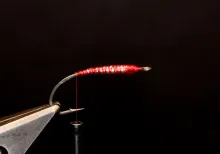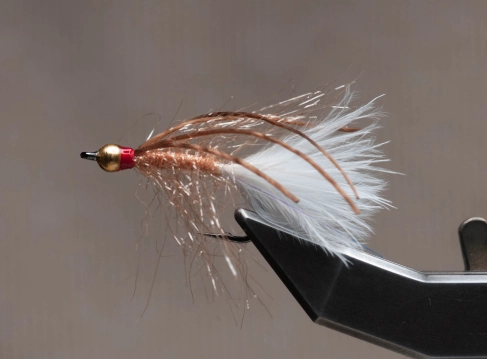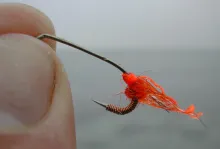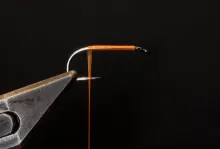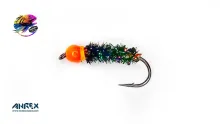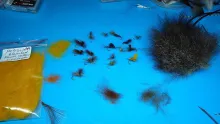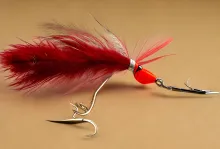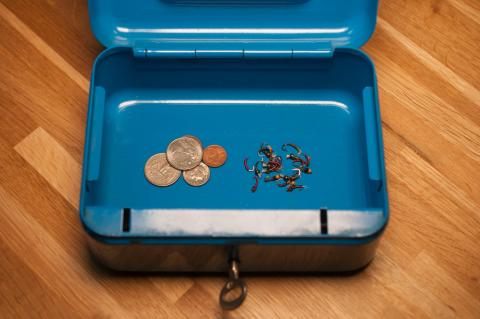A short article about adding weight to a fly – and make it do what you want and stay where you put it
Some flies are totally dependent on weight in order to penetrate the surface and get down. Some patterns just benefit from some added weight, perhaps creating a desired motion or balance in the fly.
The weight can be added in several ways, the most common ones being beads, wire, foil or eyes.
It used to be lead
In the old days - which isn't that many years ago - weight equaled lead, but nowadays lead is banned in many waters, and should be avoided for the simple reason that it’s poisonous and unhealthy.
Non-toxic alternatives are available, some of the common ones being bismuth, tungsten and various alloys or composites. Tungsten is by far the densest, but also the most expensive.
The materials are available as soft wires and foils as well as various eyes, beads and cones. In the latter selection you also find brass and even aluminum. And of course good oldfashioned bead chain is also widely available.
This article doesn’t deal with material choice, which is decided by the application and needs – and budget – but will show you how to add weight to a hook to obtain different effects on fly shape and behavior.
Beads
Beads have become the omnipresent way of weighting flies such as nymphs, jigs and even streamers such as Woolly Bugger style flies. Beads come in a colossal selection of sizes, weights and colors – and even shapes. They need not be just perfectly round balls, but can be drop-shaped, oval, faceted and asymmetrical in various ways.
Some have plain holes, some are countersunk and some have slots that allow them to pass over narrower hook gaps.
No matter the shape, you want the bead to stay where you put it, and for that to work, you can use different techniques. I usually make a thread base, and use glue or varnish to secure the bead as shown in the pictures below. Once it’s in place, you can add a thread or material wall or dam behind the bead to further keep it from shifting.
If it’s not properly fastened, it will have a tendency to slide to the rear of the fly and push back the other materials due to the immense force applied on it during a cast.
|
|
|
|
|
|
|
Neck rings
As a small aside to beads, I can mention neck rings, which are sometimes used to add accent and further weight to beaded flies. The neck ring just slides up behind the bead, and is basically secured in the same way – with a foundation of thread wraps and glue or varnish and an optional thread dam behind it to keep it in place.
Wrapped wire
The most common form of weight added under the materials is probably a simple, round wire wrapped around the hook shank. These wires come in various thicknesses, and you can select the type that suits your purpose best. It can be a compromise between weight and bulk, and also be guided by where you want the weight. A few wraps in front can give your fly a jigging motion while evenly distributed wraps along the hook shank will just add overall weight to the fly.
I usually recommend adding varnish or glue under the wire and wrapping it directly on the bare – but varnished – hook shank.
Once in place, I wrap tying thread crisscross over the weight, both to secure it and to make a smooth foundation under the following materials. If the weighted wire is thick, you may also want to use the thread to taper the “step” from the wire to the hook shank. Once the thread is done, I add more varnish and let it dry before commencing.
|
|
|
Some flies use other types of wire in a different way like the patterns Klympen, Darth Vader Nymph, Copper John or Brassie, where a copper wire forms a body - and adds weight at the same time. The wire is visible, and also adds to the appearance of the fly. When wire is used like that, I recommend varnishing it or adding a layer or LCR over it to protect if and keep it from tarnishing.
Combining weights
On the fly shown in these pictures, the tier - Dutch Marten Staal - has combined wire with a bead and a cone to get a really (like REALLY!) heavy fly. First a cone, then a bead and then wire, the two latter elements being pressed into the rear of the cone to concentrate the weight in the front of the fly.
Parallel wire
In some cases you may want the weight on the top or bottom of the hook shank – or maybe one piece on each side of the shank to form a flat body.
Here you just cut one or several pieces of suitable length, and tie it or them in where you want it. Once in place you wrap tight thread over the full length of the weight and varnish the thread.
This will enable you to place the weight to add a certain balance to the fly, and a common use is to add weight on the top of a curved hook to get the fly to turn upside down.
|
|
|
Foil
If I want to build up a certain body shape, foil is usually my material of choice. Again you can get different thicknesses and some foil types come with adhesive backsides to make it easier to get to sit.
I typically cut a elongated triangle or a pointy ellipse, which makes it easier to make a decent start and finish on a tapered body.
The foil is often quite soft, and can be pressed into shape using your fingers or pliers once it’s been wrapped. If you want a flattened body, you can use a set of flat nosed pliers to press the wrapped foil flat. Do this before the thread wraps in order not to damage the thread.
When placement and shape is as you want it, you cover the foil with tight thread wraps and varnish before tying on.
|
|
|
Eyes
Eyes can also be used to add weight, and come in different materials from the lighter bead chain type to the ultra-heavy tungsten dumbbell type. You can also get aluminum and brass eyes, which add to the selection of densities.
Again you can choose depending on desired weight – and of course the look you want.
The eyes are usually placed just behind the hook eye to induce a jigging motion in the fly, but some patterns call for eyes placed midships or even at the hook bend.
Many shrimp and crab patterns use heavy dumbbell eyes as a weight on the fly, and then use lighter eyes to be the “actual” eyes on the fly.
You usually use figure-of-eight wraps to tie in the eyes, and the technique has been covered here before, and you can check out the article Beads and eyes for details on getting them to sit.
Other types of weights
There are of course other ways of adding weight to flies, and if we move into the realm of tube flies, the selection of cones, beads and rings can become almost unfathomable. On some types of tube flies the combinations are quite complex, often consisting of several different shapes and sizes.
You can read much more about this subject in the articles Tube Basics and Discs and cones.
Flies with large amounts of epoxy or LCR also get quite heavy, and might not need further weight to get down.
- Log in to post comments





